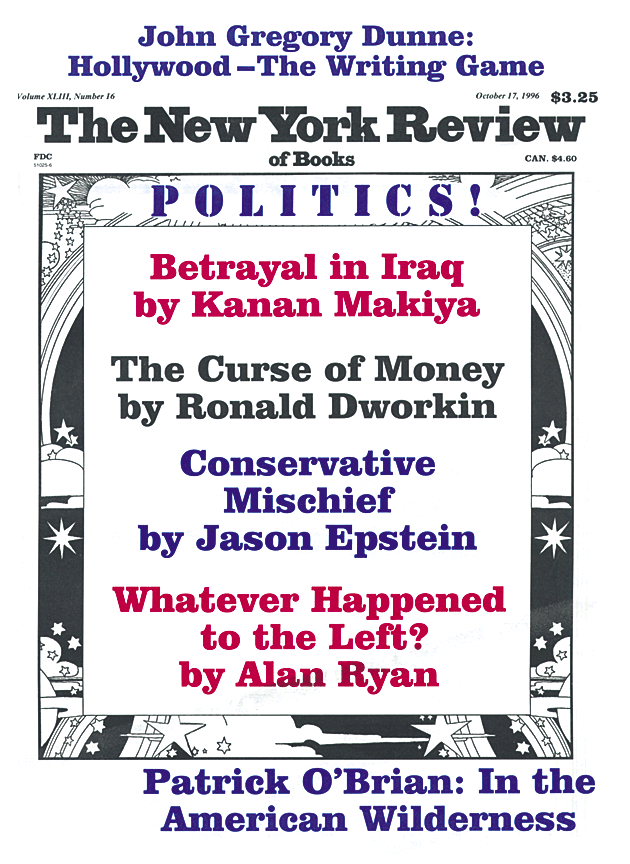In response to:
Eliot and the Jews from the June 6, 1996 issue
To the Editors:
In “The Anti-Semitism of T.S. Eliot” [NYR, June 6] Louis Menand implies that I excised an anti-Jewish sentence of Pound’s when I put the book-length essay, “Patria Mia,” into Pound’s Selected Prose 1909–1965. This is not so. The words were removed by Pound himself in 1913, when he revised “Patria Mia” for book publication. I naturally used this improved version when I edited the Selected Prose.
Louis Menand describes Pound’s “anti-Semitism” as “virulent and overt.” This won’t do, as it fails to take into account passages in the poet’s writing where he attacked anti-Semitism. I give one example: “Race prejudice is red herring. The tool of the man defeated intellectually and of the cheap politician. It is nonsense for the anglo-saxon to revile the Jew for beating him at his own game” (The Guide to Kulchur).
Those inevitably dwindling numbers of people who had the privilege of knowing Pound personally remember him as entirely without that meanness of spirit which characterizes the true anti-Semite. The Jewish poet Louis Zukofsky put this well when he recalled: “I never felt the least trace of anti-Semitism in his presence. Nothing he ever said to me made me feel the embarrassment I always have for the ‘Goy’ in whom a residue of antagonism to ‘Jew’ remains. If we had occasion to use the words ‘Jew’ and ‘Goy’ they were no more or less ethnological in their sense than ‘Chinese’ and ‘Italian.’ ”
I close this letter on a personal note. When Pound was doing his best to educate me by letter from St. Elizabeth’s in 1957–1958 (I was an English schoolboy and aspiring poet) he several times warned against anti-Semitism. I quote three sentences from those letters: “I am ‘of course’ not anti-Semitic. I am merely against irresponsible oligarchy” (February 7, 1958). “The enemy is IGGURUNCE not jews or masons” (January 10, 1958). “One should not make the battle line on the edge of race” (April 11, 1958).
William Cookson
London, England
Louis Menand replies:
I did not imply that Mr. Cookson had excised a sentence from Pound’s Patria Mia. I specifically stated that “Cookson chose to reprint a later version of the essays”—exactly the point he is at pains to make in his indignant letter. The notion that Pound did not hold anti-Semitic views is so ludicrous it is barely worth commenting on, except possibly to add the following to Mr. Cookson’s list of Pound’s remarks on the injustice of that charge: “What I am driving at is that some kike might manage to pin an antisem label on me IF he neglected the mass of my writing.”
Readers may be interested to know that Mrs. Eliot, in a letter in the TLS, has now identified the author of the unsigned review of The Yellow Spot which ran in the Criterion in 1936—a review attributed to Eliot and discussed at length by Ronald Bush in T.S. Eliot: A Study in Character and Style (1985), C.K. Stead in Pound, Yeats, Eliot, and the Modernist Movement (1986), Christopher Ricks (who notes that the attribution cannot be certain) in T.S. Eliot and Prejudice (1988), and Anthony Julius in the book I reviewed—as Montgomery Belgion. (She bases the identification on the magazine’s financial files.) Belgion was a frequent contributor to the Criterion, for which he wrote a “French Chronicle.” He was, like Eliot, an admirer of Charles Maurras: he appears, along with Eliot, as one of the trois écrivains anglais in the special issue of the French paper Aspects de la France et du Monde, published in 1948 as an homage to Maurras following his conviction for collaboration; and in that same year he wrote, for a volume commemorating Eliot’s sixtieth birthday (T.S. Eliot: A Symposium, edited by Richard March and Tambimuttu), an essay on the importance Maurras had for Eliot in his formative years. But Belgion was also, interestingly, expressly critical of the anti-Semitism of the Action Française, and his “French Chronicle” in the last issue of the Criterion (January, 1939) is an attack on the “rabidly anti-Jewish” views of Maurras and of Georges Bernanos.
This Issue
October 17, 1996


